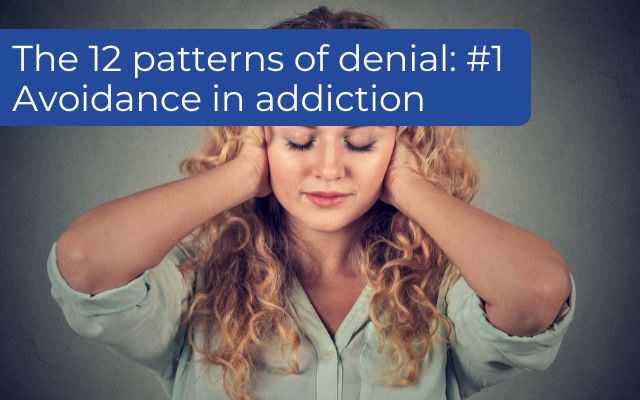
Avoidance in addiction prevents recognising harm and seeking help
Are you avoiding painful feelings or situations in ways that stop you recognising harm and seeking help?
People with addiction or substance abuse problems use different forms of denial to keep themselves in the addictive cycle. Avoidance in addiction is one example. Denial can be a dysfunctional protection mechanism which you may use to protect yourself from having to recognise, deal with and accept the reality of what is occurring in your life. This is often unconscious.
To recover from addiction, it is incredibly important to be able to identify denial. The 12 patterns of denial were developed by international addiction expert Terence Gorski. Find out how people with chemical dependency use avoidance as a denial strategy to safeguard their addictive behaviours.

What is Denial in Addiction?
Denial is the first issue to address when addicted persons enter treatment or try other ways of recovering from their substance use disorder.
Denial is when someone
- Ignores reality
- Downplays reality
- Distorts reality
Reality is painful and difficult, and the addict turns to substances or other addictive behaviours to cope – i.e., to escape.
In the words of Dr Diamond: “The addict cannot tolerate reality… Neither internal reality nor external reality”. “They find reality repugnant, uncomfortable, and overwhelming, and prefer, like the psychotic, withdrawal into fantasy, bliss, or oblivion over reality.”
The first of the 12 steps of Alcoholics Anonymous, and other 12-step programmes, is completely geared at confronting and overcoming denial: We admitted that we were powerless over alcohol/drugs – that our lives had become unmanageable.
Without truly confronting and overcoming denial, no matter how much you want to get better, denial will trip you up and prevent you from recovering. This can be a tricky process because denial comes in so many forms and has become so normalised to the addict that they struggle to even recognise when they are using a given pattern of denial.










What is Avoidance in Addiction Denial?
“I’ll talk about anything but my real problems”
Avoidance is a common pattern of denial in which the addict simply avoids thinking or talking about their addiction problem.
Deep down the chemically dependent person will know or be afraid that they have a problem but if they don’t think or talk about it, they will be OK. If they don’t think or talk about it, it doesn’t exist.
If someone confronts the person, they will change the subject or create a crisis to distract from it.
This is also known as deflecting which is a strategy to avoid “something such as criticism, blame, or a question being directed at you”.
The affected person will talk about anything under the sun, other than their own problem with substances or addictive behaviours. They will regard their drinking or drug use as a private issue that no-one has the right to speak to them about.
The person will not only avoid conversations about the substance abuse problem, they will start to avoid people who may bring up the subject of their drug or alcohol use as well as places where this problem could potentially be brought up as a topic of conversation.
Therefore, the addict might avoid therapists and therapeutic spaces or loved ones who they know will confront them about their substance use.
“Pain in this life is not avoidable, but the pain we create avoiding pain is avoidable.”
― R.D. Laing
Addicts have a strong, often unconscious, desire to protect their addiction and will aften use the denial pattern of avoidance to do so. They will avoid thinking or talking about their substance use and will end up avoiding certain people and places for the same reason.
Are you using avoidance to keep yourself in denial? Contact us for help today.
Read more about the 12 patterns of denial below:
- Absolute Denial
- Minimising
- Rationalising
- Blaming
- Comparing
- Compliance
- Manipulation
- Flight Into Health
- Recovery by Fear
- Strategic Hopelessness
- The Democratic Disease State
Avoidance in addiction hides harm and blocks help, one of the 12 patterns of denial that keep people trapped in substance misuse and prevent recovery.. Changes team counsellors are here to help you.Avoidance In Addiction Is A Hidden Pattern Of Denial








